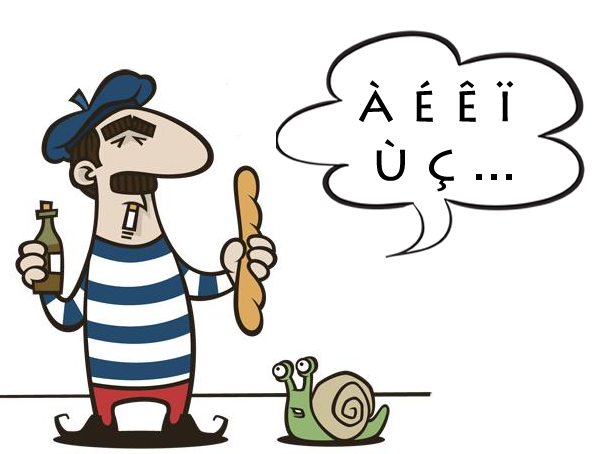Language/French/Pronunciation/Accents/it
Conoscere gli accenti francesi (les accenti français) è essenziale per scrivere corettamente in francese.
Accenti in francese cambiano la pronuncia e il significato della parola.
In questa lezione spiegheremo come usare gli accenti francesi.
5 accenti
Ci sono quattro accenti francesi per le vocali e uno per una consonante, la lettera "c".
La lettera "é" non si pronuncia lo stesso della lettera "è". Se si è in grado di sentire la differenza, si sa come scrivere una parola.
Ecco la tabella di accenti francesi:
|
scrittura |
Nome |
Esempio |
Pronuncia |
|---|---|---|---|
|
é |
Accent aigu (accento acuto) |
étudiant (alunno) |
|
|
à, è, ù |
Accent grave (accento grave) |
où (dove), après (dopo), J'habite à Paris (Vivo a Parigi) |
|
|
â, ê, î, ô,û |
Accent circonflexe (accento circonflesso) |
forêt (foresta), plâtre (gesso), île (isola), tôt (presto), août (agosto) |
|
|
ë, ï,ü |
Accent tréma (umlaut) |
Noël (Natale), naïve (ingenuo), aigüe (acuto) |
|
|
ç |
Cedille (cedilla) |
garçon (ragazzo) |
|
Accent aigu (accento acuto)
The acute accent is very frequent and can only be used with the letter "e".
Here are some useful words using the "é":
- écrire (to write) : J'aime écrire des lettres = I like writing letters
- été (summer) : Cet été j'irai à la plage = This summer I will go to the beach
- école (school) : Son école n'est pas loin d'ici = His school is not far from here
L'accent grave (grave accent)
The grave accent is only used with vowels "a", "e", and "u" like in:
- Après (after) : Après vous, je vous en prie = After you, please
- Où (where) : Où habites tu ? = Where do you live?
- À (to) : Je suis allé à Paris = I have been to Paris
L'accent circonflexe (accent circumflex)
The accent circumflex appear over any vowel and means that an S used to be in the word after the vowel.
- Forêt (forest) : J'aime marcher dans la forêt = I like to walk in the forest
- Hôpital (hospital) : Je dois aller à l'hôpital = I must go to the hospital
- S'il vous plaît (please) : S'il vous plaît, pourriez-vous m'aider = Could you please help me?
- Embûche (pitfall) : Ce parcours est semé d'embûches = This route is filled with pitfalls.
- Dégâts (damage) : L'ouragan a fait d'énormes dégâts = The hurricane caused a lot of damage.
Le tréma (umlaut)
The umlaut appears only over the vowels "e", "i" and "u".
You have to pronounce each vowel separately when you see this accent.
Words using the accent tréma include:
- Noël (Christmas) : Je serai à Paris pour Noël = I will be in Paris for Christmas
- Naïve (naïve) : Elle a l'air naïve = She looks naïve.
- Capharnaüm (mess). C'est un vrai capharnaüm ici = It's a real mess here
La cédille (cedilla)
The cedilla is also only found under the letter "c".
It changes a hard C sound (like K) into a soft C sound (like S).
Examples:
- français (French): Apprendre le français = Learn French
- ça (this) : ça me semble difficile = It looks hard
Pronunciation
The videos below will help you identify sounds of accents on the E letter :
Type French accent marks on your computer
How can you type the French accents if you don't have a French keyboard?

